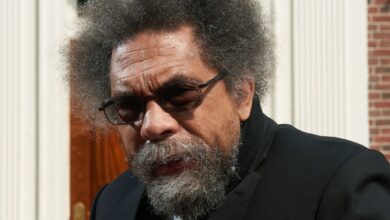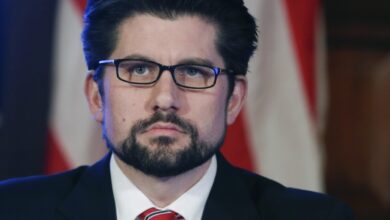Texas Lieutenant Governor Pledges to End Tenure for All New Hires

[ad_1]
Lt. Gov. Dan Patrick of Texas said on Friday that he wanted to end tenure for all newly hired faculty members at the state’s public universities and to revoke the tenure of those who teach critical race theory. Legislation to do so will be a “top priority” in the state Senate’s next session, Patrick said.
“We are not going to allow a handful of professors who do not represent the entire group to teach and indoctrinate students with critical race theory, that we are inherently racist as a nation,” Patrick, who is running for re-election in the Republican primary, on March 1, said at a news conference. “Tenure, it’s time that that comes to an end in Texas.”
Patrick said the plan was backed by Sen. Brandon Creighton, a Republican and chair of the Senate Higher Education Committee, adding that he’d spoken to university regents and leaders across the state who think that “tenure has outlived its time,” even if those officials haven’t expressed that opinion publicly. Emailed requests for comment from The Chronicle to Patrick’s chief of staff and to Creighton were not immediately returned.
Tenured faculty members would also face annual reviews under Patrick’s plan, he said. Current state law specifies that those with tenure are to be evaluated “no less often than once every six years.” Patrick did not specify if his proposal would apply to the state’s public colleges or just its public universities, but The Texas Tribune reported that the plan would affect “all new hires at Texas public universities and colleges.”
Patrick held the news conference in response to a resolution, passed on Monday, February 14, by the University of Texas at Austin’s Faculty Council, that affirmed faculty members’ academic freedom and ability to teach critical race theory and gender issues. The text of the resolution, which the council passed 41 to 5 with three abstentions, states that the council “resolutely rejects any attempts by bodies external to the faculty to restrict or dictate the content of university curriculum on any matter, including matters related to racial and social justice, and will stand firm against any and all encroachment on faculty authority, including by the Legislature or the Board of Regents.”
Members of the Faculty Council, Patrick said on Friday, “don’t understand that we in the Legislature represent the people of Texas. Of course we’re going to have a say in what the curriculum is.”
“Hiding behind this academic-freedom argument,” he added, “just doesn’t work.”
Andrea C. Gore, chair of the UT-Austin Faculty Council’s Committee of Counsel on Academic Freedom and Responsibility, who presented the resolution, said in an email to The Chronicle that she was “shocked at the LG’s response to a nonbinding Faculty Council resolution.” Though such resolutions allow faculty members to assert their rights and opinions, Gore wrote, they “typically gather dust in the Faculty Council archives.”
Patrick’s actions, Gore wrote, indicated that “not only has he been waiting for an opportunity to ban ideas that are counter to his own; he has been preparing to attack tenure as well.”
UT-Austin’s president, Jay Hartzell, affirmed the importance of tenure in a message to the campus on Monday, February 21. “Removing tenure would not only cripple Texas’ ability to recruit and retain great faculty members; it would also hurt Texas students, who would not be able to stay in state, knowing that they will be learning from the very best in the country,” Hartzell wrote. “It would also increase the risk of universities across the state making bad decisions for the wrong reasons. Future administrators might make annual retention decisions based on whether they or others did or didn’t like a faculty member’s current research agenda, rather than whether the quality of that research was excellent and held promise to have a positive impact on society in future years.”
Also on Monday, Texas A&M University’s Faculty Senate Executive Committee passed a resolution noting the importance of academic freedom and tenure.
‘Really Revolutionary’ Changes
The resolution Gore presented is based on a template, adopted by a dozen other faculty senates, that was written by professors as part of a working group convened by the African American Policy Forum.
Jennifer Ruth, a professor of film studies at Portland State University who co-wrote the template resolution, said that “the vast majority of faculty across the country understand that nobody is indoctrinating anyone” by teaching critical race theory. Some faculty organizers in the Deep South whose institutions were considering adopting a version of the template resolution, though, were concerned about whether doing so would “provoke retaliation or retribution, either for the individuals who are putting forward a resolution or for the institution as a whole.”
For that reason, Ruth said, scholars and administrators must “stand up for the way that universities actually work in democratic societies.”
Jeffrey G. Blodgett, president of the Texas conference of the American Association of University Professors, condemned Patrick’s proposal in an email to The Chronicle. “Eliminating tenure most certainly would discourage prospective faculty from accepting a position at any public university in Texas. I cannot imagine that the chancellors and presidents” of the state’s public-university systems “would be in favor of eliminating tenure, as we would certainly lose out on top talent and our flagship universities would eventually drop out of the top rankings,” Blodgett wrote.
Eliminating tenure most certainly would discourage prospective faculty from accepting a position at any public university in Texas.
He continued: “It is clear that the motivation to eliminate tenure is driven largely by ideology. Rather than being politicized, the concept of tenure should be embraced by those who truly believe in free speech. While we might not always like someone else’s opinion, we should all stand up for their right to express that opinion.”
The AAUP tweeted that Patrick’s press conference was “a naked attack on higher education in this country” marked by “so many falsehoods, misconceptions, & ridiculous rhetoric that it will take a while to dissect it.”
Shawn E. Lindsey, associate vice chancellor for media relations at the University of Houston system, said in an emailed statement that “the UH system is committed to fostering a learning environment where free inquiry, expression, and debate of competing ideas are encouraged. We look forward to working with the lieutenant governor to find ways in which we can support diversity of perspective while protecting academic freedom.”
Representatives of the state’s other public universities — Texas A&M, Texas State, and Texas Tech — did not immediately respond to requests for comment.
Scott Schneider, an expert on academic-freedom law at the firm of Husch Blackwell, said that Patrick’s plan to make teaching critical race theory grounds for revoking tenure was legally questionable. “The case law that’s developed — certainly over the last 60 or 70 years, I think — makes it pretty plain that this sort of approach violates the First Amendment,” he said.
While he’s skeptical of the idea of eliminating tenure, Schneider said, the notion of regular post-tenure reviews isn’t as “politically incendiary” and could gain some traction. Such a process, he added, could raise legal questions but not constitutional ones.
Any of the three elements of Patrick’s proposal — ending tenure for new hires, revoking the tenure of those who teach critical race theory, and instituting annual post-tenure reviews — would be “really revolutionary” on its own, and have “dramatic consequences for the future of academic freedom as a practical reality at state universities in Texas,” said Keith A. Whittington, a professor of politics at Princeton University and chair of the Academic Committee of the Academic Freedom Alliance.
Amid a host of perceived threats to academic freedom that Whittington’s organization has recently confronted, Patrick’s plans are of particular concern.
“The lieutenant-governor position is arguably the most powerful position in the state government in the state of Texas,” Whittington said. “He has extraordinary influence in the legislative process there. If he wants to stake his future political ambitions on this issue, I suspect he has some confidence that he can make some real headway on this.”
Whittington also cited a bill in South Carolina that seeks to eventually eliminate tenure. While it’s not clear how far that effort, or Patrick’s, will proceed through the legislative process, he said, “to have somebody in Dan Patrick’s position really championing those kinds of ideas, I think it’s going to give them a real boost, not only in Texas but also in other Republican-controlled states.”
[ad_2]
Source link






